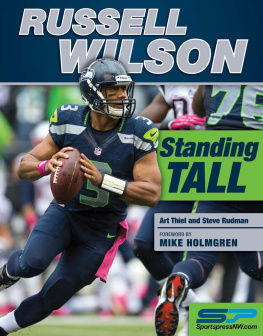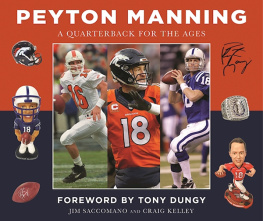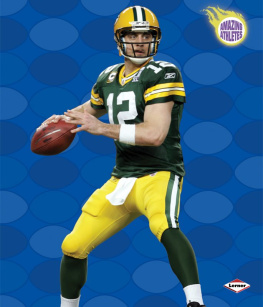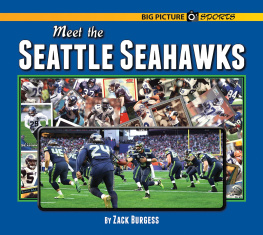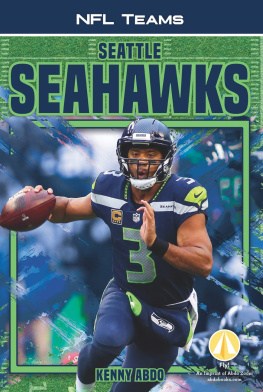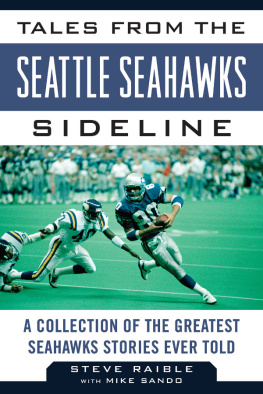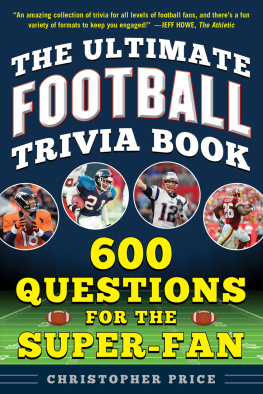
Russell Wilson earned two Pro Bowl berths in his first two seasons with the Seahawks, the first quarterback in franchise history to achieve that feat. (Photo by Drew Sellers)
Copyright 2014 by sportspressnw.com
No part of this publication may be reproduced, stored in a retrieval system, or transmitted in any form by any means, electronic, mechanical, photocopying, or otherwise, without prior written permission of the publisher, Triumph Books LLC, 814 North Franklin Street; Chicago, Illinois 60610.
This book is book is available in quantity at special discounts for your group or organization. For further information, contact:
Triumph Books LLC
814 North Franklin Street
Chicago, Illinois 60610
Phone: (312) 337-0747
www.triumphbooks.com
Printed in U.S.A.
Hardcover ISBN: 978-1-62937-080-4
Paperback ISBN: 978-1-62937-033-0
Sportspressnw.com
Co-Founders: Art Thiel and Steve Rudman
Tim Garrison (technology), Mark Hulak (business), Adam Lewis (reporter)
Content packaged by Mojo Media, Inc.
Joe Funk: Editor
Jason Hinman: Creative Director
Front and back cover photos by Drew McKenzie
This is an unofficial publication. This book is in no way affiliated with, licensed by, or endorsed by Russell Wilson, the NFL, or the Seattle Seahawks.

CONTENTS
FOREWORD
By Mike Holmgren
I will admit it: I was one of the skeptics. For years, NFL personnel have used quantitative measures to provide insight into the potential of players, including numbers for height, weight, 40-yard dash time, vertical jump, and bench press, to name a few. Hand-in-hand with these numbers is one of the most prominent NFL truisms: To play in this league, quarterbacks need to be tall.
Historically, successful quarterbacks in the NFL have been tall. Dan Marino is 64. John Elway is 63. Joe Montana and Brett Favre are 62. Boomer Esiason, Jim Kelly, Doug Williams, Troy Aikman, Tom Brady, Donovan McNabb, Ben Roethlisbergerall more than six feet, tall enough to see over their sizable offensive linemen. Only Drew Brees stands out among present and future quarterback greats as falling short of the necessary height requirement.
I was at the Cleveland Browns when Russell Wilson entered the 2012 NFL draft, and our scouting department really liked him as a player. He was an all-state quarterback at his high school in Virginia. At the University of Wisconsin, he led his team to a 2012 Big Ten Championship and a Rose Bowl berth. Everyone recognized that he was a really good player. But questions loomed over where he would be taken in the draft.
The problem? He is 511.
On draft day, size worked against him. A lot of teams passed on Wilson, until the Seattle Seahawks selected him in the third round. Some news outlets described the Seahawks as taking a chance on his ability to play quarterback because of his size.
In return, he beat the odds by leading his team to a Super Bowl victory.
I believe Wilson has become the archetype for why it is necessary to look beyond the statistics to the intangibles that separate the good players from the great players.
Quality of character.
Perseverance to win despite obstacles.
Commitment to studying the opponent.
Heart for the team and the community.
It has been my privilege to get to know Russell during his brief tenure in the NFL. It is clear to me that these are the characteristics that define him, not his size. He displays a remarkable maturity and clarity of purpose.
It is not uncommon to hear stories of him studying film at the facility in the early hours of the morning, only to conclude the day visiting with children at a local hospital or nonprofit organization. He leads his team with his work ethic rather than his words to the press.
At 25, a year removed from his rookie season, he is still learning the game, yet he displays the awareness and understanding of a seasoned veteran. In games when mistakes can mean the difference between a win and a loss, Wilson doesnt make mistakes.

During the 2012 season, Russell Wilson had three consecutive games with a passer rating of 125.0 or higher, becoming the first NFL rookie to accomplish that feat. (Photo by Drew McKenzie)
Fellow skeptics need no more solid evidence than Super Bowl XLVIII, where football fans were treated to storyline after storyline of one of the most prolific NFL quarterbacks of all time: Peyton Manning. The game was supposed to belong to him. Instead the victory went to the upstart, who, with calm efficiency and team play, led Seahawks to victory.
And that is just Wilson the player. It is difficult to believe, but Russell is an even a better person than he is a quarterback. He is really solid. He is exactly the kind of player, as a competitor and a person, a coach wants leading his team.
I have had the privilege of coaching some of the games great quarterbacks: Joe Montana, Steve Young, Brett Favre, Mark Brunell, Matt Hasselbeck, and others. They led their teams to Super Bowls. They were elected to the Pro Bowl. A few are in the Hall of Fame. I have no doubt that, if he continues on the trajectory of success established in just two seasons, Wilson has a chance to be remembered among the greats. There is no reason to think he wont continue that success.
Russell Wilson has already proved me wrong once. I have learned my lesson. Dont bet against this underdog. 
INTRODUCTION
By Art Thiel
R elative to, say, the 13.8 billion-year-old universe, 35 years is not much time. Relative to, say, the Twitterverse, 35 years is equal to 3.386 eternities. Since we in the sports realm are closer to grasping Twitter, its fair to suggest that the void between major professional sports championships in Seattle was long, dark, and cold.
Which is why Russell Wilson, at 25, deserves a book. He filled the void.
Pro team championships are elusive, especially in Seattle. The 1979 NBA SuperSonics had been the most recent victorsa franchise that no longer exists, at least in the hearts of those in the mossiest corner of the fruited plain. To even get a title chance was rarethe Sonics did again in 1996, when they found in the Finals Michael Jordan and maybe the best team in NBA history, and the 2005 Seahawks, who found the much-beloved Pittsburgh Steelers in Super Bowl XL and official incompetence rarely seen outside North Korea.
Thats it. The Mariners? Not so much. They are one of two Major League Baseball teams to have never reached the World Series.
Then on February 2, 2014, at MetLife Stadium in the New Jersey swamplands, the Seahawks, led by Wilson, obliterated the Denver Broncos 438. For those witnesses purely interested in dramatic spectacle, the game was a flop. For fans of the Seahawks, it was majestic.
Looming over the depth and breadth of the beat down was an unprecedented experience for Seahawks fans: a favored, well-regarded team throughout the season and playoffs, not only met expectations but it also exceeded them.
Fear of failure is writ large in the Northwest sporting psyche. Always, a trap door awaits. A banana peel sneaks underfoot. The 404 error message appears just before sending.
Next page
